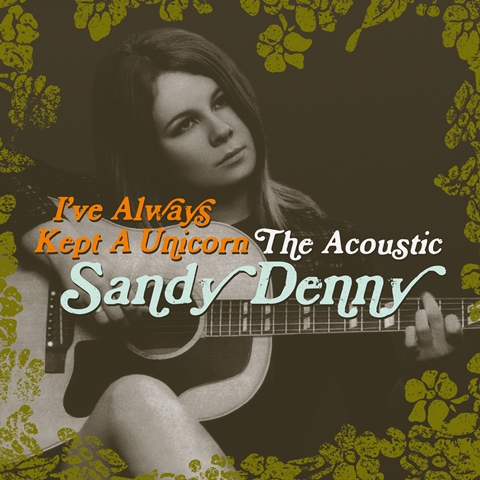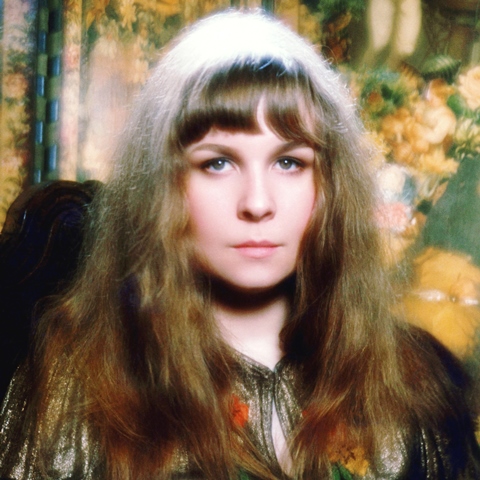Reissue CDs Weekly: Sandy Denny | reviews, news & interviews
Reissue CDs Weekly: Sandy Denny
Reissue CDs Weekly: Sandy Denny
Collection of acoustic recordings is an indispensable primer on one of Britain’s most important voices

Is there anything left to say about Sandy Denny? Sadly, she cannot say anything herself, as she died in 1978. So it’s left to what she released during her lifetime, posthumous appraisals and reappraisals, and packages and repackages to do the talking.
In 2010, the career-spanning, 19-disc box set Sandy Denny was issued. That could have been the last word and was measured against her issued discography of four solo albums, the three with Fairport Convention, and one with Fotheringay, as well as sundry collaborations. Fotheringay were recently the subject of a box set and her solo albums have been reissued with bonus tracks. Biographies have been published, and there have been tribute concerts.
Interest in Denny remains high, but the question remains: is there anything left to say? The new double CD I’ve Always Kept a Unicorn: The Acoustic Sandy Denny borrows its title from the most recent biography. The liner notes proclaim it to be “the best album Sandy Denny never made”. Some assertion. But the book was sensitive and insightful, and this new collection has liner notes by its author, Mick Houghton. This is a plus, suggesting these two CDs may not be an aural cut-and-paste job.
 Bearing in mind that Denny has been looked into so extensively, it is no surprise that …Unicorn includes very few unreleased tracks. The three heard date from 1974 and are acoustic demos for the album by The Bunch, a Fairport Convention and Fotheringay offshoot. Featuring Richard Thompson and Trevor Lucas on guitar, these are versions of Buddy Holly’s “Learning the Game” and “Love’s Made a Fool of You” and The Everly Brothers’ “When Will I Be Loved”, sung as a duet with Linda Thompson. None can be considered essential. I’ve Always Kept a Unicorn: The Acoustic Sandy Denny, then, stands or falls with how it presents what is included.
Bearing in mind that Denny has been looked into so extensively, it is no surprise that …Unicorn includes very few unreleased tracks. The three heard date from 1974 and are acoustic demos for the album by The Bunch, a Fairport Convention and Fotheringay offshoot. Featuring Richard Thompson and Trevor Lucas on guitar, these are versions of Buddy Holly’s “Learning the Game” and “Love’s Made a Fool of You” and The Everly Brothers’ “When Will I Be Loved”, sung as a duet with Linda Thompson. None can be considered essential. I’ve Always Kept a Unicorn: The Acoustic Sandy Denny, then, stands or falls with how it presents what is included.
Initial doubts about this release evaporate while listening to the 40 cuts. The free-ranging track selection corrals demos (solo and with Fairport Convention), live and studio session recordings for the BBC and the odd alternate take. It is so free-ranging that the Fotheringay version of “Wild Mountain Thyme” features electric guitar and bass. Chronologically ordered, what emerges is – the three cover versions noted above notwithstanding – an entirely consistent listen. The arrangements given to some of Denny’s released recordings could overwhelm both her and her songs, and it is interesting that her former manager Roy Guest says in the liner notes: “I could never convince her that she didn’t need other musicians. She felt the sound was better with the texture of other musicians but that wasn’t true. She was wonderful on her own, especially in the ‘70s; Sandy had the ability to be a completely solo artist.”
 If there was – and there most probably was – a confidence issue about standing alone, hearing the solo Denny on …Unicorn establishes that she was utterly self-assured within the most bare of musical frames. Take the solo “Autopsy”, which Fairport Convention recorded for 1969’s Unhalfbricking. This must be as the band first experienced the song and solo – it has the same power and melodic strength as the best of Jackson C. Frank’s recordings. Not folk as such, it is instead up-to-the minute singer-songwriter fare which could have posited her as a British Joni Mitchell or James Taylor. (Pictured left: a visual gloss applied to Sandy Denny in 1972.)
If there was – and there most probably was – a confidence issue about standing alone, hearing the solo Denny on …Unicorn establishes that she was utterly self-assured within the most bare of musical frames. Take the solo “Autopsy”, which Fairport Convention recorded for 1969’s Unhalfbricking. This must be as the band first experienced the song and solo – it has the same power and melodic strength as the best of Jackson C. Frank’s recordings. Not folk as such, it is instead up-to-the minute singer-songwriter fare which could have posited her as a British Joni Mitchell or James Taylor. (Pictured left: a visual gloss applied to Sandy Denny in 1972.)
Effectively, …Unicorn makes the case that an alternate Denny existed alongside the one who released records. Sometimes, it’s hard not to wonder about the choices of what was issued. The version of “One Way Donkey Ride” here is a one-take run-through of the song from 1976 which became the basis of the layers of instrumentation added for 1977’s unsatisfying Rendezvous album. The affecting mood of the solo foundation was lost by the time it hit the shops.
When Denny performed solo live, there was no chance that distracting gloss could be added. The television recording of “No More Sad Refrains”, as Houghton puts it, “stands out for the sheer emotional intensity that’s lacking on the studio version, once again revealing how the studio environment could nullify the purity of Sandy’s songwriting and delivery.”
The kneejerk reaction to I’ve Always Kept a Unicorn: The Acoustic Sandy Denny was that it was going to be a waste of time and, indeed, say nothing which had not been said before. The opposite is true. Head for this primer to discover what Sandy Denny was about.
Share this article
The future of Arts Journalism
You can stop theartsdesk.com closing!
We urgently need financing to survive. Our fundraising drive has thus far raised £49,000 but we need to reach £100,000 or we will be forced to close. Please contribute here: https://gofund.me/c3f6033d
And if you can forward this information to anyone who might assist, we’d be grateful.

Subscribe to theartsdesk.com
Thank you for continuing to read our work on theartsdesk.com. For unlimited access to every article in its entirety, including our archive of more than 15,000 pieces, we're asking for £5 per month or £40 per year. We feel it's a very good deal, and hope you do too.
To take a subscription now simply click here.
And if you're looking for that extra gift for a friend or family member, why not treat them to a theartsdesk.com gift subscription?
more New music
 Album: Night Tapes - portals//polarities
Estonian-voiced, London-based electro-popsters debut album marks them as one to watch for
Album: Night Tapes - portals//polarities
Estonian-voiced, London-based electro-popsters debut album marks them as one to watch for
 Album: Mulatu Astatke - Mulatu Plays Mulatu
An album full of life, coinciding with a 'farewell tour'
Album: Mulatu Astatke - Mulatu Plays Mulatu
An album full of life, coinciding with a 'farewell tour'
 Music Reissues Weekly: Sly and the Family Stone - The First Family: Live At Winchester Cathedral 1967
Must-have, first-ever release of the earliest document of the legendary soul outfit
Music Reissues Weekly: Sly and the Family Stone - The First Family: Live At Winchester Cathedral 1967
Must-have, first-ever release of the earliest document of the legendary soul outfit
 Album: Robert Plant - Saving Grace
Mellow delight from former Zep lead
Album: Robert Plant - Saving Grace
Mellow delight from former Zep lead
 Brìghde Chaimbeul, Round Chapel review - enchantment in East London
Inscrutable purveyor of experimental Celtic music summons creepiness and intensity
Brìghde Chaimbeul, Round Chapel review - enchantment in East London
Inscrutable purveyor of experimental Celtic music summons creepiness and intensity
 First Person: Musician ALA.NI on how thoughts of empire and reparation influenced a song
She usually sings about affairs of the heart - 'TIEF' is different, explains the star
First Person: Musician ALA.NI on how thoughts of empire and reparation influenced a song
She usually sings about affairs of the heart - 'TIEF' is different, explains the star
 Album: NewDad - Altar
The hard-gigging trio yearns for old Ireland – and blasts music biz exploitation
Album: NewDad - Altar
The hard-gigging trio yearns for old Ireland – and blasts music biz exploitation
 Album: The Divine Comedy - Rainy Sunday Afternoon
Neil Hannon takes stock, and the result will certainly keep his existing crowd happy
Album: The Divine Comedy - Rainy Sunday Afternoon
Neil Hannon takes stock, and the result will certainly keep his existing crowd happy
 Music Reissues Weekly: Robyn - Robyn 20th-Anniversary Edition
Landmark Swedish pop album hits shops one more time
Music Reissues Weekly: Robyn - Robyn 20th-Anniversary Edition
Landmark Swedish pop album hits shops one more time
 Album: Twenty One Pilots - Breach
Ohio mainstream superstar duo wrap up their 10 year narrative
Album: Twenty One Pilots - Breach
Ohio mainstream superstar duo wrap up their 10 year narrative
 Album: Ed Sheeran - Play
A mound of ear displeasure to add to the global superstar's already gigantic stockpile
Album: Ed Sheeran - Play
A mound of ear displeasure to add to the global superstar's already gigantic stockpile
 Album: Motion City Soundtrack - The Same Old Wasted Wonderful World
A solid return for the emo veterans
Album: Motion City Soundtrack - The Same Old Wasted Wonderful World
A solid return for the emo veterans

Add comment